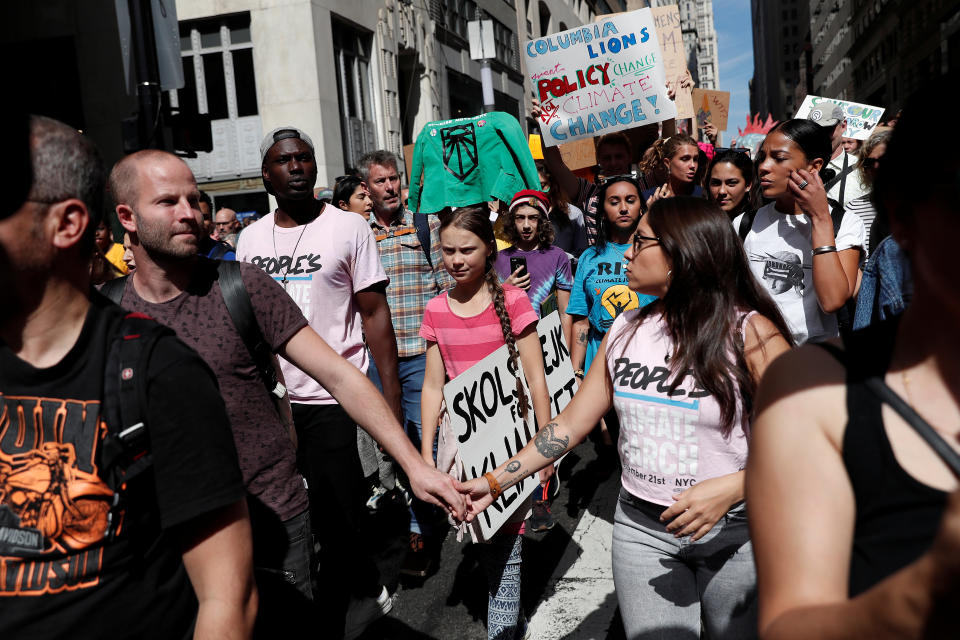Major companies launch initiative to curb greenhouse gas emissions
Major multinational companies including Google (GOOG) and Danone (DANOY) are launching a new initiative aimed at curbing greenhouse gas emissions, as cries for the private sector to act on climate change grow louder.
Formed in partnership with the World Business Council for Sustainable Development and a group of 19 corporations that include L’Oreal (OR.PA), Kellogg Company (K), Nestle (NSRGY), and Unilever (UN), the “One Planet Business for Biodiversity” (OP2B) initiative targets the agriculture practices of member companies, calling for increased diversity in its supply chains and farming practices.
It specifically commits corporations to an October 2020 deadline to “Disclose ambitious, time bound and measurable commitments,” along with policy proposals to deliver outcomes.
“According to many recent scientific studies, we have ten years to reset our course and bend the curve on climate change and wild and cultivated biodiversity loss,” said Emmanuel Faber, Chairman and CEO of Danone in a statement. “We need a collective effort now.”

The announcement comes as world leaders gather for the United Nations’s Climate Action Summit to demonstrate their commitments to slowing global warming. UN Secretary General Antonio Guterres has said the talks bring added urgency this year, with sea levels and temperatures rising at alarming rates. The last four years have been the hottest on record.
Guterres called on leaders to come with “concrete realistic plans” that contribute to the UN’s larger goal of reducing greenhouse gas emissions by 45% over the next decade, and net zero emissions by 2050. But the U.S., the world’s second largest emitter of greenhouse gas emissions, will be absent from the climate discussions for the second year in a row, raising questions about the UN’s effectiveness in tackling the issue.
“My main objective is to make as much noise as I can and do as much as I can to support as many actors involved,” Guterres told reporters, ahead of the gathering.
The nineteen companies that make up the OP2B coalition generate a combined revenue of $500 billion. The initiative calls on corporations to focus on three specific areas: increased biodiversity to reduce overreliance on a limited number of crops, elimination of deforestation, and scaling up of regenerative agriculture practices, to ensure the soil used can improve the local and global ecosystem.
The private sector has increasingly looked to tackle the issue of climate change, in part because of the economic toll studies suggest the rise of global temperatures could have. A recent study by the National Bureau of Economic Research found that an average annual increase in global temperatures by 0.04 degrees celsius would reduce real GDP by 7.22% by 2100. The same study found that abiding by the Paris Climate Agreement would limit the increase to 0.01 degrees celsius, and limit the GDP loss to 1.07%.
Workers are also taking note. An estimated 4 million people globally marched in the Climate Strike Friday, according to activist groups, making it the largest climate demonstration in history.
-
Akiko Fujita is an anchor and reporter for Yahoo Finance. Follow her on Twitter at @AkikoFujita
More from Akiko:
Former U.S. ambassador to China warns Beijing intervention in Hong Kong will provoke Taiwan
'The ultimate insult': How U.S.-listed Chinese companies are gaming American investors'
Really bad business practice': U.S. security experts sound off on Huawei
U.S.-China showdown: Huawei has 'completely taken over' the Mobile World Congress
Read the latest financial and business news from Yahoo Finance
Follow Yahoo Finance on Twitter, Facebook, Instagram, Flipboard, LinkedIn, YouTube, and reddit.



